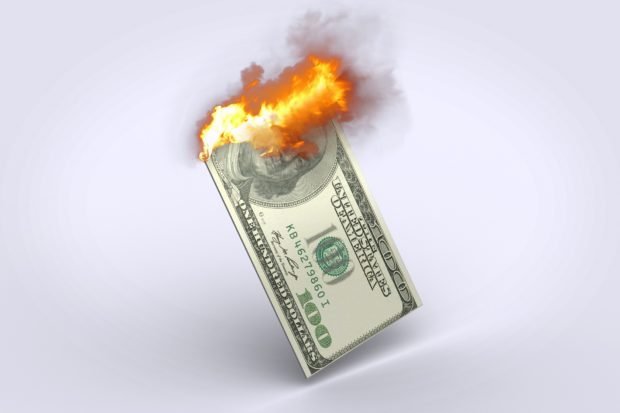




A series of recent moves by the U.S. and foreign actors is increasingly calling into question the dollar’s long-term status as the world’s reserve currency, a situation that could reduce America’s influence on the global stage, economists told the Daily Caller News Foundation.
China has long attempted to challenge the dollar’s international dominance, most recently through a deal with French energy firm TotalEnergies, the first ever settled by the firm in Chinese yuan in an industry dominated by the “petrodollar,” Fortune reported. While it could take decades for such an effort to play out to completion, the dollar is “increasingly under siege” as the world’s reserve currency, Peter Earle, economist at the American Institute for Economic Research, told the DCNF.
A key reason for this is the increasing “weaponization” of the U.S. dollar to achieve certain foreign policy objectives, such as attempts to cut off Iran and Russia from foreign markets, Earle said. While there remain “formidable barriers” to the adoption of an alternative currency — such as the yuan — “many nations, large and small, are seeking alternatives to trading in dollars” which some nations are increasingly seeing as an “Achilles’ Heel to national sovereignty,” according to Earle.
More so than any other recent action, foreign governments are likely being motivated by the Biden administration’s decision to freeze Russian central bank assets held in the U.S., Peter St. Onge, an economist at the Heritage Foundation, told the DCNF. The move — which Treasury Secretary Janet Yellen described as “unprecedented” — essentially trapped all the Western dollar holdings of the Russian central bank, thanks to joint actions taken by the European Union and Japan, according to The New York Times.
“I think the seizure of the Russian central bank assets was a complete game changer for countries all over the world,” St. Onge said. “[E]ven during the Cold War, when we were having proxy wars with Russia, across three continents, we did not seize their dollars, because there was a gentleman’s agreement … this administration threw that away by seizing … the dollar holdings of the Russian central bank. That puts every other country on Earth on notice: that you may think you have dollars but only if we like you.”
To hedge their bets, countries are likely to diversify their reserves away from the dollar, according to St. Onge. He pointed to recent remarks from Indonesian President Joko Widodo, who warned a meeting of the Association of Southeast Asian Nations (ASEAN) of the “possible geopolitical repercussions” of continued reliance on the dollar and called for member nations to phase out foreign payment systems and trade in local currencies, according to ASEAN Briefing.
China has been taking steps to increase the value of the yuan as a competitor to the dollar, particularly among its regional trading partners and in its international investments, Foreign Policy reported last September. The country has encouraged the BRICS (Brazil, Russia, India, China and South Africa) nations and nations in the Asia-Pacific region to conduct their trade in local currencies, such as the yuan, to provide financial security against potential external threats.
The share of Russian exports paid for in yuan, for example, has skyrocketed to 14%, up from 0.4% before the Russian invasion of Ukraine, The Wall Street Journal reported in February. Russian households held roughly $6 billion in yuan in Russian banks in 2022 after starting the year with none.
As recently as Tuesday, the Prime Minister of Malaysia, Anwar Ibrahim, said that there was “no reason for Malaysia to continue depending on the dollar,” and announced that Chinese President Xi Jingping had agreed to open talks on an “Asian Monetary Fund” that could compete with the U.S. dollar and the International Monetary Fund, according to Bloomberg. The recent relative strength of the dollar — the Bloomberg dollar index hit a record high in September 2022 — has devalued Southeast Asian currencies, sending Malaysia’s ringgit to historic lows.
Chinese President Xi Jinping urged Gulf Coast nations to conduct oil and gas trades in yuan in a speech in Saudi Arabia, Reuters reported. The Middle Eastern kingdom’s alliance with the U.S. has faced significant strain recently, and Saudi Arabian oil companies have recently announced several multibillion dollar oil and gas projects in China.
While the yuan is unlikely to soon replace the dollar outright, political concerns may cause nations to diversify their assets into a “mixture of currencies that very specifically does not include the United States dollar,” St. Onge told the DCNF. “So China’s not going to get 100% of it, but there’s a good chance that the U.S. gets 0% of it.”
In such a scenario, a flood of dollars returning to the U.S. — St. Onge estimates there are roughly $2 in international circulation for every $1 in the U.S. — could cause significant problems for U.S. policymakers, St. Onge said.
“If the dollar falls, we will get 80 years of money-printing rushing back home like a tsunami,” said St. Onge. “If that happens, the inflation, and the hit on fragile banks, would be like nothing we’ve ever seen.”
However, the strength of the U.S. dollar could be seen as just that, according to Jordan McGillis, a policy analyst at the Manhattan Institute, who told the DCNF that the dollar remains essential to global markets and that China’s strict control of its own capital worked counter to its efforts to displace the dollar. While recent efforts by the U.S. to freeze Russia out of global markets has led to an increase in trade in non-dollar currencies, concerns about the dollar, while “not totally unfounded,” did not warrant significant panic, he said.
“A University of Chicago poll of currency experts performed in March of last year, less than a quarter of economists believed that this ‘weaponization’ of dollar finance would lead to a ‘significant shift’ away from the dollar,” McGillis said, referencing a March 2022 poll of U.S. and European economists conducted by the University of Chicago’s Booth Review. “The evidence, so far, bears that out, with the U.S. Dollar Index currently higher than it was at the start of 2022 and also higher than it was at any point in the 15 years before covid-19.”
Content created by The Daily Caller News Foundation is available without charge to any eligible news publisher that can provide a large audience. For licensing opportunities of our original content, please contact licensing@dailycallernewsfoundation.org
Support Conservative Daily News with a small donation via Paypal or credit card that will go towards supporting the news and commentary you've come to appreciate.
